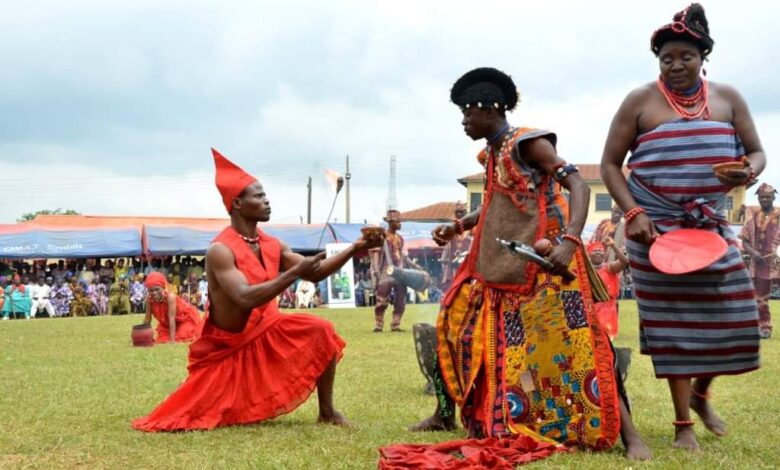Famous Nigerian Myths and Legends

Nigeria, with its diverse ethnic groups and rich cultural history, is a land steeped in myths and legends that have been passed down through generations. These stories, often imbued with moral lessons and cultural significance, offer a fascinating glimpse into the beliefs and traditions of Nigerian societies. Here are some of the most famous myths and legends from Nigeria:
1. The Legend of Sango
Sango, the god of thunder and lightning, is a prominent figure in Yoruba mythology. According to legend, Sango was a powerful king who became a deity after his death. Known for his fierce temper and magical powers, he is often depicted wielding a double-headed axe, which he uses to control thunder and lightning. The myth of Sango emphasizes the themes of power, justice, and the divine nature of leadership.
2. The Story of Queen Amina
Queen Amina of Zazzau (present-day Zaria) is a legendary figure in Hausa folklore. She is celebrated for her military prowess and leadership, reputed to have expanded her kingdom through numerous conquests. Her legend highlights her as a warrior queen who defied traditional gender roles, and she is remembered for her bravery, strategic skills, and dedication to her people.
3. The Tale of the Tortoise and the Hare
While this tale is popular across various African cultures, the Nigerian version of the story involves a cunning tortoise who outwits a boastful hare in a race. The tortoise’s success is attributed to its cleverness and persistence, conveying important lessons about humility and the rewards of perseverance over arrogance.
4. The Myth of the Osun-Osogbo Sacred Grove
The Osun-Osogbo Sacred Grove, a UNESCO World Heritage Site, is deeply rooted in Yoruba mythology. The legend tells of the goddess Osun, who is believed to have created the river that flows through the grove. The sacred grove is considered a spiritual sanctuary, and the myths associated with it highlight the reverence for nature and the divine presence within the natural world.
5. The Story of Eyo Masquerades
The Eyo Festival in Lagos is not only a vibrant cultural event but also steeped in myth. The Eyo masquerades are believed to represent the spirits of deceased ancestors, and their elaborate costumes and masks symbolize the connection between the living and the spirit world. The legends surrounding the Eyo masquerades emphasize themes of ancestral reverence and the continuity of cultural traditions.
6. The Legend of Mami Wata
Mami Wata, often depicted as a beautiful mermaid or water spirit, is a prominent figure in various West African mythologies, including those in Nigeria. She is associated with the waters and is believed to have the power to bestow wealth, beauty, and mystical abilities. The myths surrounding Mami Wata often involve themes of seduction, power, and the complex relationship between humans and the supernatural.
7. The Myth of Ijapa the Tortoise
Ijapa, or the tortoise, is a central character in many Nigerian folktales. Known for his cleverness and trickery, Ijapa’s stories often involve him outsmarting other animals or overcoming seemingly insurmountable challenges through his wits. These myths reflect the value placed on intelligence and ingenuity in Nigerian culture.
8. The Legend of the Black Panther
Among the Ibibio and Efik peoples, the black panther is considered a powerful and mystical creature. According to legend, the black panther is a guardian spirit with the ability to bring good fortune or invoke fear. The myths surrounding this creature highlight its role as a symbol of strength and protection.
9. The Story of Olokun
Olokun is a deity associated with the sea and wealth in Yoruba mythology. Legends describe Olokun as a powerful and enigmatic figure who controls the depths of the ocean and possesses great riches. The myths surrounding Olokun emphasize the dual nature of the sea as both a source of abundance and a domain of mystery.
10. The Myth of the Forbidden Forest
In various Nigerian cultures, certain forests are considered sacred and are associated with powerful spirits or deities. The myths surrounding these forbidden forests often involve tales of supernatural beings that inhabit the forests, protecting them from intruders and ensuring that they remain untouched. These legends highlight the reverence for nature and the belief in the spiritual significance of certain places.
These myths and legends form an integral part of Nigeria’s cultural heritage, reflecting the diverse beliefs and values of its people. Through these stories, the rich tapestry of Nigerian folklore is preserved, offering insights into the traditional wisdom, moral teachings, and spiritual practices that continue to shape the cultural landscape of the nation.




